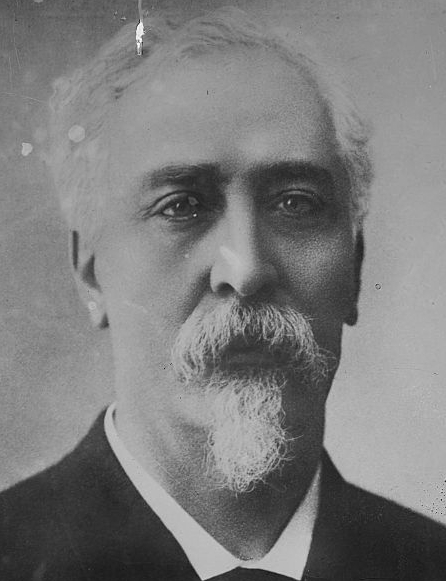|
August 1910 Greek Legislative Election
Parliamentary elections were held in Greece on .Dieter Nohlen & Philip Stöver (2010) ''Elections in Europe: A data handbook'', p829 Eleftherios Venizelos had begun to dominate the political life of the country. He was listed as a candidate by his followers and was elected with the most votes at the Attica-Boeotia constituency. The United Parties won 211 of the 362 seats. Stefanos Dragoumis remained Prime Minister until his resignation on , when Venizelos became Prime Minister.FEK A 313/1910, http://www.et.gr/idocs-nph/search/pdfViewerForm.html?args=5C7QrtC22wGjMvHQD_V6sndtvSoClrL8VUSpgL_HkaB5MXD0LzQTLWPU9yLzB8V68knBzLCmTXKaO6fpVZ6Lx9hLslJUqeiQtpS7TPdBQw2IGgm0thEXOLSYFQ28-sUNpae5KH0Ix3k Because Venizelos did not have the confidence of Parliament, he agreed with King George to dissolve parliament. Fresh elections were held in November. Results References {{Greek elections Greece 1910 08 1910 in Greece 1910s in Greek politics History of Greece (1909–1924) Greece ... [...More Info...] [...Related Items...] OR: [Wikipedia] [Google] [Baidu] |
Hellenic Parliament
The Hellenic Parliament ( el, Ελληνικό Κοινοβούλιο, Elliniko Kinovoulio; formally titled el, Βουλή των Ελλήνων, Voulí ton Ellínon, Boule (ancient Greece), Boule of the Greeks, Hellenes, label=none), also known as the Parliament of the Hellenes, the Hellenic Bouleterion or Greek Parliament, is the Unicameralism, unicameral legislature of Greece, located in the Old Royal Palace, overlooking Syntagma Square in Athens. The parliament is the supreme democratic institution that represents the citizens through an elected body of Members of Parliament (MPs). It is a Unicameralism, unicameral legislature of 300 members, elected for a four-year term. In 1844–1863 and 1927–1935, the parliament was Bicameralism, bicameral with an upper house (the Greek Senate, senate) and a lower house (the chamber of deputies), which retained the name . Several important Greek statesmen have served as the speaker of the Hellenic Parliament. History Constitutiona ... [...More Info...] [...Related Items...] OR: [Wikipedia] [Google] [Baidu] |
Stefanos Dragoumis
Stefanos Dragoumis ( el, Στέφανος Δραγούμης; 1842September 17, 1923) was a judge, writer and the Prime Minister of Greece from January to October 1910. He was the father of Ion Dragoumis. Early years Dragoumis was born in Athens. His grandfather, Markos Dragoumis (1770–1854), who was born in a prominent Greek family from Vogatsiko in the present Kastoria regional unit, had been a member of the 1814–1821 revolutionary Filiki Eteria, while his father Nikolaos Dragoumis was secretary of Ioannis Kapodistrias. Born in Athens in 1842, Dragoumis studied law at the University of Paris and became a judge. Political career He became Secretary-General of the Ministry of Justice and was very active politically. He was later elected a member of Parliament and served as Minister of Foreign Affairs, Minister of Justice and Minister of the Interior. He was also active in the Macedonian Struggle. The organization ''Macedonian Committee'' was formed in 1904 by Stephanos Dra ... [...More Info...] [...Related Items...] OR: [Wikipedia] [Google] [Baidu] |
Eleftherios Venizelos
Eleftherios Kyriakou Venizelos ( el, Ελευθέριος Κυριάκου Βενιζέλος, translit=Elefthérios Kyriákou Venizélos, ; – 18 March 1936) was a Greek statesman and a prominent leader of the Greek national liberation movement. He is noted for his contribution to the expansion of Greece and promotion of liberal-democratic policies.Kitromilides, 2006, p. 178"Liberty Still Rules" '''', 18 February 1924. As leader of the , he held office as |
Prime Minister Of Greece
The prime minister of the Hellenic Republic ( el, Πρωθυπουργός της Ελληνικής Δημοκρατίας, Prothypourgós tis Ellinikís Dimokratías), colloquially referred to as the prime minister of Greece ( el, Πρωθυπουργός της Ελλάδας, Prothypourgós tis Elládas), is the head of government of the Hellenic Republic and the leader of the Greek Cabinet. The incumbent prime minister is Kyriakos Mitsotakis, who took office on 8 July 2019 from Alexis Tsipras. The officeholder's official seat (but not residence) is the Maximos Mansion in the centre of Athens. The office is described in the Constitution either as Prime Minister or President of the Government (Πρόεδρος της Κυβερνήσεως). This is the reason why the prime minister is also addressed as "Mr/Madam President". Election and appointment of the prime minister The prime minister is officially appointed by the president of Greece. According to Article 37 of t ... [...More Info...] [...Related Items...] OR: [Wikipedia] [Google] [Baidu] |
Independent Politician
An independent or non-partisan politician is a politician not affiliated with any political party or bureaucratic association. There are numerous reasons why someone may stand for office as an independent. Some politicians have political views that do not align with the platforms of any political party, and therefore choose not to affiliate with them. Some independent politicians may be associated with a party, perhaps as former members of it, or else have views that align with it, but choose not to stand in its name, or are unable to do so because the party in question has selected another candidate. Others may belong to or support a political party at the national level but believe they should not formally represent it (and thus be subject to its policies) at another level. In running for public office, independents sometimes choose to form a party or alliance with other independents, and may formally register their party or alliance. Even where the word "independent" is used, s ... [...More Info...] [...Related Items...] OR: [Wikipedia] [Google] [Baidu] |
Greece
Greece,, or , romanized: ', officially the Hellenic Republic, is a country in Southeast Europe. It is situated on the southern tip of the Balkans, and is located at the crossroads of Europe, Asia, and Africa. Greece shares land borders with Albania to the northwest, North Macedonia and Bulgaria to the north, and Turkey to the northeast. The Aegean Sea lies to the east of the Geography of Greece, mainland, the Ionian Sea to the west, and the Sea of Crete and the Mediterranean Sea to the south. Greece has the longest coastline on the Mediterranean Basin, featuring List of islands of Greece, thousands of islands. The country consists of nine Geographic regions of Greece, traditional geographic regions, and has a population of approximately 10.4 million. Athens is the nation's capital and List of cities and towns in Greece, largest city, followed by Thessaloniki and Patras. Greece is considered the cradle of Western culture, Western civilization, being the birthplace of Athenian ... [...More Info...] [...Related Items...] OR: [Wikipedia] [Google] [Baidu] |
Dieter Nohlen
Dieter Nohlen (born 6 November 1939) is a German academic and political scientist. He currently holds the position of Emeritus Professor of Political Science in the Faculty of Economic and Social Sciences of the University of Heidelberg. An expert on electoral system An electoral system or voting system is a set of rules that determine how elections and referendums are conducted and how their results are determined. Electoral systems are used in politics to elect governments, while non-political elections ma ...s and political development, he has published several books. IDEA Bibliography Books published by Nohlen include: *''Electoral systems of the world'' (in German, 1978) *''Lexicon of politics'' (seven volumes) *''Elections and Electoral Systems'' (1996) *''Electi ...[...More Info...] [...Related Items...] OR: [Wikipedia] [Google] [Baidu] |
Vote Of No Confidence
A motion of no confidence, also variously called a vote of no confidence, no-confidence motion, motion of confidence, or vote of confidence, is a statement or vote about whether a person in a position of responsibility like in government or management is still deemed fit to hold that position, such as because they are inadequate in some aspect, fail to carry out their obligations, or make decisions that other members feel to be detrimental. The parliamentary motion demonstrates to the head of government that the elected Parliament either has or no longer has confidence in one or more members of the appointed government. In some countries, a no-confidence motion being passed against an individual minister requires the minister to resign. In most cases, if the minister in question is the premier, all other ministers must also resign. A censure motion is different from a no-confidence motion. Depending on the constitution of the body concerned, "no confidence" may lead to the dismi ... [...More Info...] [...Related Items...] OR: [Wikipedia] [Google] [Baidu] |
George I Of Greece
George I ( Greek: Γεώργιος Α΄, ''Geórgios I''; 24 December 1845 – 18 March 1913) was King of Greece from 30 March 1863 until his assassination in 1913. Originally a Danish prince, he was born in Copenhagen, and seemed destined for a career in the Royal Danish Navy. He was only 17 years old when he was elected king by the Greek National Assembly, which had deposed the unpopular Otto. His nomination was both suggested and supported by the Great Powers: the United Kingdom of Great Britain and Ireland, the Second French Empire and the Russian Empire. He married Grand Duchess Olga Constantinovna of Russia in 1867, and became the first monarch of a new Greek dynasty. Two of his sisters, Alexandra and Dagmar, married into the British and Russian royal families. Edward VII of the United Kingdom and Alexander III of Russia were his brothers-in-law, and George V of the United Kingdom, Christian X of Denmark, Haakon VII of Norway, and Nicholas II of Russia were his nephew ... [...More Info...] [...Related Items...] OR: [Wikipedia] [Google] [Baidu] |
November 1910 Greek Legislative Election
Parliamentary elections were held in Greece on , following elections in August.Dieter Nohlen & Philip Stöver (2010) ''Elections in Europe: A data handbook'', p829 The Liberal Party won 307 of the 362 seats. Eleftherios Venizelos remained Prime Minister, having assumed office on 18 October.Nohlen & Stöver, p868 Results References {{Greek elections Greece 1910 11 1910 in Greece 1910s in Greek politics History of Greece (1909–1924) Greece Greece,, or , romanized: ', officially the Hellenic Republic, is a country in Southeast Europe. It is situated on the southern tip of the Balkans, and is located at the crossroads of Europe, Asia, and Africa. Greece shares land borders with ... Legl ... [...More Info...] [...Related Items...] OR: [Wikipedia] [Google] [Baidu] |
1910 Elections In Europe
Year 191 ( CXCI) was a common year starting on Friday (link will display the full calendar) of the Julian calendar. At the time, it was known as the Year of the Consulship of Apronianus and Bradua (or, less frequently, year 944 ''Ab urbe condita''). The denomination 191 for this year has been used since the early medieval period, when the Anno Domini calendar era became the prevalent method in Europe for naming years. Events By place Parthia * King Vologases IV of Parthia dies after a 44-year reign, and is succeeded by his son Vologases V. China * A coalition of Chinese warlords from the east of Hangu Pass launches a punitive campaign against the warlord Dong Zhuo, who seized control of the central government in 189, and held the figurehead Emperor Xian hostage. After suffering some defeats against the coalition forces, Dong Zhuo forcefully relocates the imperial capital from Luoyang to Chang'an. Before leaving, Dong Zhuo orders his troops to loot the tombs of the Ha ... [...More Info...] [...Related Items...] OR: [Wikipedia] [Google] [Baidu] |
Parliamentary Elections In Greece
A parliamentary system, or parliamentarian democracy, is a system of democratic governance of a state (or subordinate entity) where the executive derives its democratic legitimacy from its ability to command the support ("confidence") of the legislature, typically a parliament, to which it is accountable. In a parliamentary system, the head of state is usually a person distinct from the head of government. This is in contrast to a presidential system, where the head of state often is also the head of government and, most importantly, where the executive does not derive its democratic legitimacy from the legislature. Countries with parliamentary systems may be constitutional monarchies, where a monarch is the head of state while the head of government is almost always a member of parliament, or parliamentary republics, where a mostly ceremonial president is the head of state while the head of government is regularly from the legislature. In a few parliamentary republics, among ... [...More Info...] [...Related Items...] OR: [Wikipedia] [Google] [Baidu] |



